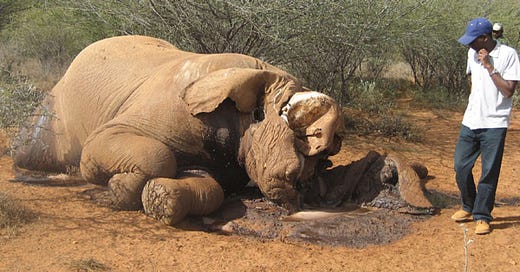Vietnamese Syndicates Wiping out African Megafauna
Poaching syndicates reach their tentacles into remotest corners of continent
By: Gregory McCann
Vietnamese syndicates play an outsized, sophisticated role in the illicit trade of elephant ivory, rhinoceros horn, pangolin scales, and other wildlife products, according to a recent undercover investigation by the Environmental Investigation Agency that details sourcing, packing, and transporting ivory and rhino horn through an intricate maze of transport routes out of various African ports to Malaysia, then through Laos, and finally overland into Vietnam.
The numbers are staggering. Since 2009, 11,414 elephants have been slaughtered, their ivory “processed” and soaked in wax before being concealed in timber and quartz and being sent through bribed customs agents in countries like Mozambique, Nigeria, and Tanzania before reaching similarly bribed officials in Kuala Lumpur and Johor, according to the report, titled Exposing the Hydra: the growing role of Vietnamese syndicates in ivory trafficking. There, “Specialist Transporters” such as the recently arrested Teo Boon Ching take over.
Teo was recently extradited from Thailand to the United States and imprisoned for 18 months for his role in trying to sell rhino horn to customers in New York City, repackage the illicit cargo and send it onward to Wattay International Airport in Vientiane, where connections and money were to get it cleared through customs, loaded onto trucks, and then rolled northeast for Vietnam. In Vietnam itself, police and other officials need to be paid off as well, all accounted for in the pricing of the ivory and rhino horns.
Perhaps the most impressive aspect of the EIA’s report is the nine highly detailed portraits of the main syndicate culprits. These individuals range from Phan Chi, head of a syndicate who seemingly operates with impunity and enjoys close relations with high-level officials in several African countries as well as in Vietnam, living in luxury on a “retirement visa” in South Africa, to “independent operators” who scout out remote African villages to encourage and incentivize locals to hunt down elephants, to the aforementioned “specialist transporter” Teo Boon Ching, now serving time in a US prison, to “workers” such as Duong Van Dang who import quartz from Vietnam into Africa and specialize in concealing ivory and rhino horn. Dang is also adept at using timber for the same cover, and was taught by his older brother how to seal the products in wax first.
There was obviously considerable danger in going this deep undercover, in actually meeting syndicate members, procuring secret video footage of their operations –including stacks of ivory – proposing deals with them in order to get access to their documentation and details of their illegal shipping methodologies, and even getting their photographs. Phan Chi boasted of having his own entourage of 10 personal “soldiers” who have helped him evade any legal action whatsoever, and who could procure 15 tonness of ivory a month, so the EIA investigators are to be highly commended for their brilliant and brave work.
One disturbing feature of the report is just how prominent a role Malaysia and Laos play as key transport hubs, and how seemingly entrenched corruption is at the airports and other hubs in these nations. EIA has in the past shown how Laos’ Special Economic Zone or SEZ in Bokeo province is a hotbed for the illegal wildlife trade; where Chinese restaurant owners sell tiger meat, tiger wine, bear paws, pangolins, and other protected species with impunity. Chinese tycoon and “drug kingpin” Zhao Wei, who is sanctioned by the US government, also allegedly has his fingers in child prostitution and the illegal wildlife trade, making his Kings Romans casino and tourist “resort” a hellhole for a variety of crime. Local media reports in Thailand describe dead bodies washing down the Mekong River, some headless, seemingly from the direction of Laos.
Taken together with the magnitude of corruption described in the EIA’s report of Laos as a key transport hub for the shipping of ivory and rhino horn bound for Vietnam (some of which goes onwards to China), the scale of illegal activity taking place in the land-locked country is likely so far off the charts that it’s difficult to comprehend.
Every African country is being targeted by the Vietnamese syndicates, with rare “yellow ivory” procured from endangered forest elephants in Cameroon. Mozambique’s elephant and rhino populations are becoming so depleted by the work of these syndicates that much of the sourcing is now likely coming from South African game reserves. These syndicates are waging a war on African megafauna, and bribery and corruption make it all possible. It is astounding to realize that the wretched handiwork of a handful of wily criminals could quite possibly lead to the extinction of some of the largest and most majestic megafauna on the planet: African elephants and rhinoceros.
But the recent arrest and jailing of key player Teo, who was recorded on video bragging of his ability to avoid detection by authorities anywhere, offers a ray of hope. The names and specific activities of the key players have been laid bare by the hard work of the EIA, and the information is in the hands of the relevant African, Asian, and American authorities. It is up to the governments of these countries to stamp them out, bring them to justice, and save Africa’s wildlife before it’s too late.
Gregory McCann is an assistant professor at a Taiwanese university and is author of the book Called Away by a Mountain Spirit: Journeys to the Green Corridor.



